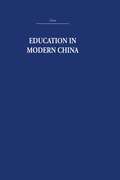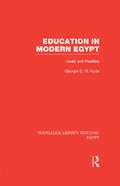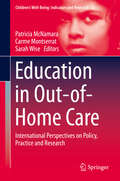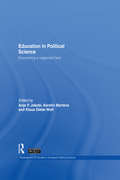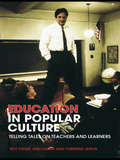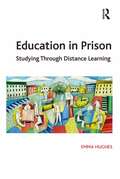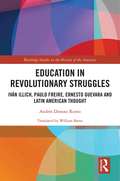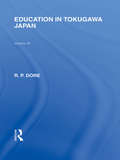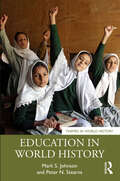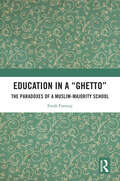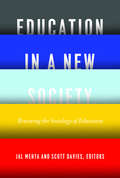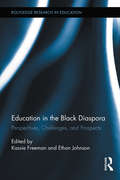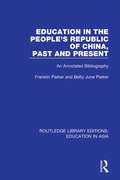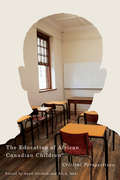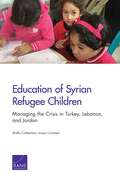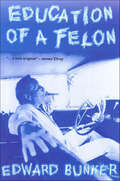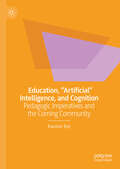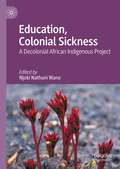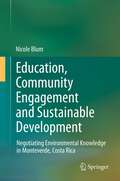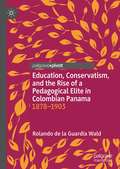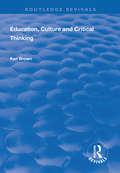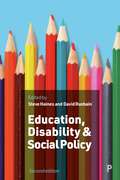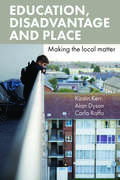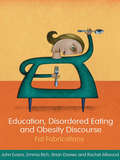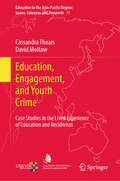- Table View
- List View
Education in Modern China
by R.F. PriceFirst published in 1970 this re-issues the revised edition of 1979. This book examines the part played both by tradition and by the Cultural Revolution in the educational system of twentieth century China and explores the apparent reversal of policy which took place since the death of Mao. The book discusses the writings of Mao on the nature of man, society and knowledge and his ideas on education. These are then seen in the context of history, philosophy and religion. Educational aims and policies are discussed, showing how factors such as language, geography, economics and the social structure created obstacles to reform.
Education in Modern Egypt: Ideals and Realities (Routledge Library Editions: Egypt)
by Georgie D.M. HydeThis study gives a comprehensive account of the evolution of the educational system in Modern Egypt, set against the events of the last twenty five years. From the Revolution of 1952, which saw the breakdown of the party system, seen as ‘sham democracy’, to the re-adoption of the party system in 1976, the Egyptian government has searched for an ideal system that is secular, but not irreligious, and benefitting from, but not copying, the western or eastern models. Professor Hyde has analysed the problems of the educational system, administrative, institutional, theoretical and practical, and related them to Egypt’s urgent need to modernise the state, and to improve the quality of life of her hitherto deprived masses. The deficiencies of the system are discussed with emphasis on the attempts to provide solutions, mainly within the framework of reformed institutions. Informal and private education, literacy campaigns, women’s aspirations and student welfare are all considered, as are policies and plans for the immediate and long-term solutions of Egypt’s problems. The analysis also takes into account socio-economic factors in post-Revolutionary Egypt which not only constitute instruments of change in Egyptian society but also provide the restraints which prevent the rapid translation of educational ideals into reality. First published 1978.
Education in Out-of-Home Care: International Perspectives on Policy, Practice and Research (Children’s Well-Being: Indicators and Research #22)
by Sarah Wise Carme Montserrat Patricia McNamaraThis book draws together for the first time some of the most important international policy practice and research relating to education in out-of-home care. It addresses the knowledge gap around how good learning experiences can enrich and add enjoyment to the lives of children and young people as they grow and develop. Through its ecological-development lens it focuses sharply on the experience of learning from early childhood to tertiary education. It offers empirical insights and best practices examples of learning and caregiving contexts with children and young people in formal learning settings, at home and in the community. This book is highly relevant for education and training programs in pedagogy, psychology, social work, youth work, residential care, foster care and kinship care along with early childhood, primary, secondary and tertiary education courses.
Education in Political Science: Discovering a neglected field (Routledge/ECPR Studies in European Political Science)
by Anja P. Jakobi Kerstin Martens Klaus Dieter WolfThis pioneering volume is devoted to the analysis of education from the perspective of political science, applying the full range of the discipline's analytical perspectives and methodological tools. The contributions demonstrate how education policy can be explored systematically from a variety of political science perspectives: comparative politics, public policy analysis and public administration, international relations, and political theory. By applying a governance perspective on education policy, the authors explore the changing institutional settings, new actors' constellations, horizontal modes of interaction and public-private regulatory mechanisms with respect to the role of the state in this policy field. The volume deals with questions that are not merely concerned with the content or outcomes of education, but it explicitly takes a political science view on how education politics work. Including country case studies from the Americas and across Europe, institutional analyses of education policy in the EU and the WTO/GATS as well as normative reflections on the topic, the volume provides a grand overview on the diversity of issues in education policy. Dealing with a so far neglected field of policy, this book provides a comprehensive and accessible analysis of a rapidly changing topic. Education in Political Science will be of interest to scholars and students of political science, education, sociology and economics.
Education in Popular Culture: Telling Tales on Teachers and Learners
by Roy Fisher Christine Jarvis Ann HarrisEducation in Popular Culture explores what makes schools, colleges, teachers and students an enduring focus for a wide range of contemporary media. What is it about the school experience that makes us wish to relive it again and again? The book provides an overview of education as it is represented in popular culture, together with a framework through which educators can interpret these representations in relation to their own professional values and development. The analyses are contextualised within contemporary, historical and ideological frameworks, and make connections between popular representations and professional and political discourses about education. Through its examination of film, television, popular lyrics and fiction, this book tackles educational themes that recur in popular culture, and demonstrates how they intersect with debates concerning teacher performance, the curriculum and young people’s behaviour and morality. Chapters explore how experiences of education are both reflected and constructed in ways that sometimes reinforce official and professional educational perspectives, and sometimes resist and oppose them. Education in Popular Culture will stimulate critical reflection on the popular myths and professional discourses that surround teachers and teaching. It will serve to deepen analyses of teaching and learning and their associated institutional and societal contexts in a creative and challenging way.
Education in Prison: Studying Through Distance Learning
by Emma HughesThe role of education in prisons, prisoners' decisions regarding education, the impact of prison culture on either encouraging or discouraging such activities, and the potential consequences of education for prisoners' reentry into society all have important implications. This extended analysis of prisoner education represents a unique contribution to an under-researched field, whilst also making important and original connections between research on education in prison and the literature on adult learning in the community. Through offering crucial insights into the varied motivations and disincentives that inform prisoners' decisions to study in prison (whether it be through distance learning or prison-based classes), the reader is also able to consider factors that inform decisions to engage in a broader range of positive and constructive activities whilst in prison. These research findings provide insight into how prison culture and prison policies may impact upon rehabilitative endeavour and suggest ways in which prisons may seek to encourage constructive and/ or rehabilitative activities amongst their inhabitants if desired. Based on interviews and questionnaires completed by British adult prisoners studying through distance learning, this qualitative study offers a valuable complement and counterpart to prison education studies that focus on measuring recidivism rates. The learner-centred approach used yields a nuanced and complex understanding of the varied ways in which education in prison actually operates and is experienced, and considers the consequences of this for the students' lives. As such, the findings offer further insight into important evidence resulting from recidivism studies reviewed within the book, whilst contributing to the reemerging interest in studies of prison life and prison culture that are based on prisoner interviews.
Education in Revolutionary Struggles: Iván Illich, Paulo Freire, Ernesto Guevara and Latin American Thought
by Andrés Donoso RomoEducation in Revolutionary Struggles introduces us to the fascinating world of Latin American educational thought in the third quarter of the 20th century. It discusses the contributions of three of the most distinguished intellectuals of the period – Iván Illich, Paulo Freire and Ernesto Guevara – and more specifically their answers to the eternal challenge: What is – or should be – the role of education in the profound structural and/or revolutionary transformation of our societies? The first part of the book identifies the cultural, economic and political context of the revolutionary years in Latin America. This historical framework is of particular interest because it is the setting for the intellectual and educational debates in which these three thinkers took part. The second part, the heart of the book, expounds in depth how Iván Illich, Paulo Freire and Ernesto Guevara contributed to understanding of how education is linked to the transformation of society. The third and final part highlights the most fertile dimensions of the educational thought of Iván Illich, Paulo Freire and Ernesto Guevara – deschooling, liberation education and revolutionary education respectively – and analyses the points where their conceptions of "education in revolutionary struggles" converged, complemented one another or diverged.
Education in Tokugawa Japan (Routledge Library Editions: Japan)
by Ronald DoreJapanese cultural life had reached a low ebb at the beginning of the Tokugawa period. The Japanese society which emerged when Tokugawa Ieyasu had completed the process of pacifying warring baronies was neither literary, nor hardly literate. The rulers were warriors and the people they ruled were largely illiterate. The Japan of 1868 was a very different society: practically every samurai was literate and it was a world in which books abounded. The transformation which had occurred in these two and a half centuries was an essential precondition for the success of the policy which the leaders of the Meiji Restoration were to adopt. An in-depth survey of the development and education during the period, this book remains one of the key analyses of the effects of Tokugawa educators and education on modern day Japan.
Education in World History (Themes in World History)
by Peter N. Stearns Mark S. JohnsonEducation in World History shows how broad currents in transnational history have interacted with trends in educational organization and teaching practices over time. From antiquity and early classical societies to present day, this book highlights the ways in which changes in religious and intellectual life and economic patterns in key world regions have generated developments in education. Since the postclassical period, cross-cultural connections have also influenced educational change. In more recent times, transnational dialogues and mobility have played a vital role in shaping educational patterns. Ranging through South and East Asia, Africa, Europe and the Americas, the book also considers how the impact of modern forces, such as industrialization and nationalism, have transformed education in fundamental ways. Throughout the volume, Mark S. Johnson and Peter N. Stearns emphasize the tensions between elite and state educational interests and more diverse popular demands for access and, often, for more innovative pedagogy. Suitable for introductory world history and history of education courses, this lively overview reconsiders the history of education from the perspective of world and comparative history.
Education in a 'Ghetto': The Paradoxes of a Muslim-Majority School
by Farah FarooqiThis book explores the structures of power and politics within a government-aided school situated in a Muslim-majority area in Delhi, India. It provides a look into how teachers, administrators and students in low-income and disadvantaged communities navigate limited opportunities and resources. The book discusses the socio-economic and cultural background of students, institutional rituals and practices and the impact of power relations on the students. It critiques the power and privilege of those in positions of authority in the school and showcases how bureaucratic systems in state run schools often do not consider the circumstances and interests of students and often hinder their growth. This book will be of interest to students of education, sociology, development studies, political science and social work. It will also be useful to educationalists, sociologists, political scientists, NGOs and those interested in the interface of state, society and education.
Education in a New Society: Renewing the Sociology of Education
by Jal Mehta Scott DaviesIn recent decades, sociology of education has been dominated by quantitative analyses of race, class, and gender gaps in educational achievement. And while there’s no question that such work is important, it leaves a lot of other fruitful areas of inquiry unstudied. This book takes that problem seriously, considering the way the field has developed since the 1960s and arguing powerfully for its renewal. The sociology of education, the contributors show, largely works with themes, concepts, and theories that were generated decades ago, even as both the actual world of education and the discipline of sociology have changed considerably. The moment has come, they argue, to break free of the past and begin asking new questions and developing new programs of empirical study. Both rallying cry and road map, Education in a New Society will galvanize the field.
Education in the Black Diaspora: Perspectives, Challenges, and Prospects (Routledge Research in Education)
by Kassie Freeman Ethan JohnsonThis volume gathers scholars from around the world in a comparative approach to the various educational struggles of people of African descent, advancing the search for solutions and bringing to light new facets of the experiences of black people in the era of globalization.
Education in the People's Republic of China, Past and Present: An Annotated Bibliography (Routledge Library Editions: Education in Asia #10)
by Franklin Parker Betty June ParkerThe 3,053 entries in this work, first published in 1986, comprise the compliers' attempt at a comprehensive annotated bibliography of the most useful locatable books, monographs, pamphlets, regularly and occasionally issued serials, scholarly papers, and selected newspaper accounts dealing in a significant way with formal and informal, public and private education in the People's Republic of China before and since 1949.
Education of African Canadian Children: Critical Perspectives
by Awad Ibrahim and Ali A. AbdiHundreds of thousands of African Canadian children demand and deserve quality education that promotes success both within and outside of school. Recognizing that the education these young people receive will shape their lives as citizens, the contributors to this volume provide an important, timely analysis of the educational experiences of African Canadian children and youth. With contributions from leading and emerging scholars, The Education of African Canadian Children critically responds to and comments on the historical, cultural, institutional, and informational contexts and problems of the learning lives of these children. The authors offer a comprehensive history of African Canadians’ encounters with the education system, the current challenges they are facing, and opportunities for more inclusive and democratic educational practices that will better serve this population. Advocating for cultural redemption and learning success for a population that is not being served well by Canadian public education systems, this book will benefit teachers, students, government program managers, policy makers, and educational researchers. The first multi-authored work of its kind, The Education of African Canadian Children opens new debates and possibilities for change for those concerned with education in their communities and their country.
Education of Syrian Refugee Children
by Louay Constant Shelly CulbertsonWith four million Syrian refugees as of September 2015, there is urgent need to develop both short-term and long-term approaches to providing education for the children of this population. This report reviews Syrian refugee education for children in the three neighboring countries with the largest population of refugees--Turkey, Lebanon, and Jordan--and analyzes four areas: access, management, society, and quality.
Education of a Felon: A Memoir
by Edward Bunker“A masterful summation of the hard and brutal life of crime and prison from . . . America’s foremost chronicler of prison life.” —Los Angeles TimesIn Education of a Felon, the reigning champion of prison novelists finally tells his own story. The son of an alcoholic stagehand father and a Busby Berkeley chorus girl, Bunker was—at seventeen—the youngest inmate ever in San Quentin. His hard-won experiences on L.A.’s meanest streets and in and out of prison gave him the material to write some of the grittiest and most affecting novels of our time.From smoking a joint in the gas chamber to leaving fingerprints on a knife connected to a serial killer, from Hollywood’s steamy underside to swimming in the Neptune pool at San Simeon, Bunker delivers a memoir as colorful as any of his novels and as compelling as the life he’s lead.“Bunker writes in straight-ahead, unadorned prose and, refreshingly, he refrains from excessive psychologizing and sentimentalizing . . . a rough-hewn memoir by a rough-hewn man.” —The New York Times Book Review“In this picaresque, harrowing, humorous yet deeply sad excursion through his dark-starred youth, Bunker—arguably the most renowned convict writer in America—serves as both participant in and witness to the mid-century carnival of L.A. crime immortalized by James Ellroy . . . a thought-provoking and richly re-created tale of a career criminal.” —Publishers Weekly
Education, "Artificial" Intelligence, and Cognition: Pedagogic Imperatives and the Coming Community
by Kaustuv RoyThis book initiates fresh pedagogic thinking on the nature of intelligence and human potentiality in the midst of a rising panic over so-called artificial intelligence. At the rate of current advancement, entire social and cultural landscapes including education and work are going to change in unprecedented ways in the near future. In light of these developments, the author sets out to critically assess the role of education in creating the capacity to distinguish between machinic &“intelligence&” and organic intelligence, thus helping us move from passive acceptance to active becoming.
Education, Colonial Sickness: A Decolonial African Indigenous Project
by Njoki Nathani WaneIn the last two decades, we have witnessed the quest for decolonization; through research, writing, teaching, and curriculum across the globe. Calls to decolonize higher education have been overwhelming in recent year. However, the goal of decolonizing has evolved past not only the need to dismantle colonial empires but all imperial structures. Today, decolonization is deemed a basis for restorative justice under the lens of the psychological, economic, and cultural spectrum. In this book, the editor and her authors confront various dimensions of decolonizing work, structural, epistemic, personal, and relational, which are entangled and equally necessary. This book illuminates other sites and dimensions of decolonizing not only from Africa but also other areas. This convergence of critical scholarship, theoretical inquiry, and empirical research is committed to questioning and redressing inequality in contemporary history and other African studies. It signals one of many steps in a bid to consultatively examine how knowledge and power have been both defined and subsequently denied through the sphere of academic practice.
Education, Community Engagement and Sustainable Development
by Nicole BlumA growing body of research has given critical attention to diverse theories and practices of environmental education, and its potential contribution to addressing pressing global issues such as sustainable development and climate change. While much of this work has focused on perspectives and practices in Europe and North America, this book explores environmental learning within formal education, in programmes by non-governmental organisations, and in public education spaces in Monteverde, Costa Rica. The discussion also highlights the need for more research to understand the broader social and economic interactions between such efforts and the communities in which they are located.
Education, Conservatism, and the Rise of a Pedagogical Elite in Colombian Panama: 1878-1903
by Rolando de la Guardia WaldThis book historically reconstructs the conservative and moderate liberals’ views on governance, morality, and education within the context of La Regeneración (1878-1903) in Colombian Panama. de la Guardia Wald explores the way political theories and ideologies, especially conservatism and positivism, shaped late nineteenth-century Panamanian pedagogues’ conceptualizations of proper education for the sake of social regeneration. By demonstrating that Isthmian political and pedagogical debates went beyond the preoccupation for the realisation of classic liberalism and exploitation of Panama’s geographical views, this book challenges the perspective that Panamanian identity was a fabrication of the United States. Instead, this study reveals that the combination of positivist and conservative understandings of morality, reason, and good science defined governmental policies intended to recuperate and enhance civic values and nationalism, leading the way to progress and modernity.
Education, Culture and Critical Thinking (Routledge Revivals)
by Ken BrownPublished in 1998. Interest in the subject of "critical thinking" has mounted, seeking ways to transcend rote learning and to remedy a widely perceived lack of critical, analytical abilities amongst school students. A growing literature on "teaching thinking" and "problem solving" maintains this commitment, reflecting a common belief that thinking skills of a general nature can not only be identified, but can be taught successfully. The paucity of empirical evidence that intellectual skills thus identified actually transfer between domains of thought or subject matters has done little to diminish faith in the possiblity that this is achievable. The principal message of this book is that theories of critical thinking which disregard its historical origins and dialectical, traditional character are likely to be seriously flawed. All human societies exhibit problem solving abilities, often of a high order - all language and thought is fundamentally criteriological. Relevant distinctions between critical thought and its alternative are found in history and culture, in dialogue and criticism, not just in the operations of individual minds. The critical traditions embody a sovereign principle - a criterion of the effectiveness of educational institutions to represent the legacy and social liberties and democratic values in which they are deeply enmeshed.
Education, Disability and Social Policy
by Steve Haines and David RuebainEducational opportunities for disabled children remain a vital contemporary issue in British social policy. This new edition of the milestone book Education, Disability and Social Policy outlines critical debates in education concerning the position and experiences of disabled children and young people within a contemporary policy context. Incorporating new voices from leading thinkers, this second edition includes a fresh introduction and updates to key chapters, including whether the Children and Families Act (2014) resolved tensions between parents and local authorities over resources, and proposals for a whole-school, strengths-based approach to social, emotional and mental health difficulties. In addition, it includes a new discussion on the intersection of race and disability.
Education, Disadvantage and Place: Making the Local Matter
by Alan Dyson Kirstin KerrIn England, as in countries across the world, shrinking public funding, growing localism, and increased school autonomy make tackling the link between education, disadvantage and place more important than ever. Challenging current thinking, this important book is the first to focus on the role of area-based initiatives in this struggle. It brings together a wide range of evidence to review the effectiveness of past initiatives, identify promising recent developments, and outline innovative ways forward for the future. It shows how local policymakers and practitioners can actively respond to the complexities of place and is aimed at all those actively seeking to tackle disadvantage, including policymakers, practitioners, academics and students, across education and the social sciences.
Education, Disordered Eating and Obesity Discourse: Fat Fabrications
by Brian Davies John Evans Emma Rich Rachel AllwoodEating less, exercising more and losing weight seem the obvious solution for the oncoming 'obesity epidemic'. Rarely, however, is thought given to how these messages are interpreted and whether they are in fact inherently healthy. Education, Disordered Eating and Obesity Discourse investigates how 'body centred talk' about weight, fat, food and exercise is recycled in schools, enters educational processes, and impacts on the identities and health of young people. Drawing on the experiences of young women who have developed eating disorders and research on international school curricula and the media, the authors challenge the veracity, substance and merits of contemporary 'obesity discourse'. By concentrating on previously unexplored aspects of the debate around weight and health, it is revealed how well-meaning advice can propel some children toward behaviour that seriously damages their health. This book is not only about 'eating disorders' and the people affected, but the effects of obesity discourse on everyone’s health as it enters public policy, educational practice and the cultural fabric of our lives. It will interest students, teachers, doctors, health professionals and researchers concerned with obesity and weight issues.
Education, Engagement, and Youth Crime: Case Studies in the Lived Experience of Education and Recidivism (Education in the Asia-Pacific Region: Issues, Concerns and Prospects #71)
by Cassandra Thoars David MoltowThis book presents insights into how affective educational experiences may be associated with youth criminal behaviour and the pathway to recidivism. It explores the perspectives and lived school experiences of five young adult male prison inmates, including while they were incarcerated as youths. Through these case studies, the book explores the relationship between affective engagement in education and recidivism.This book shows that participants were affectively disengaged from education prior to their initial incarceration in a youth detention facility, and that their disaffection before, during, and after youth incarceration both generated and impacted on their cognitive and behavioural disengagement from education. Moreover, a range of additional factors not directly causally related to their schooling were shown to have had a significant effect on their engagement in education. The book considers a number of key findings. First, the foundational role that a sense of belonging plays in how young people experience education and its relation to crime. Second, the importance of individualized transition plans for youth at risk, and youth offenders before, during, and after incarceration. Third, the extent to which successful transition from youth offending and recidivism hinges on interagency collaboration. This book will be beneficial to teacher educators, education researchers, criminologists and sociologists.
